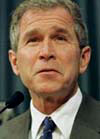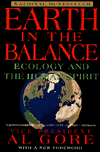The environment should be a winning electoral issue for Al Gore, so why has he said so little about it — thus far — during his run for president? Day after day, the vice president pounds away on his core themes of health care, education, the booming economy, and now, his sinner’s conversion to campaign finance reform. Meanwhile, he mentions the environment only sporadically. That’s odd coming from the author of Earth in the Balance, but it’s also a mistake. The truth is, the environment could be the key to a Gore victory in November, if he has the wit to link it to the issue that decides most U.S. presidential elections: the economy.

You can call him Al.
Of course, now that Bill Bradley has dropped out of the race, Gore may simply be taking the green vote for granted. Or perhaps he’s downplaying his environmental credentials for fear that Texas Gov. George W. Bush will deride him as “Ozone Man,” like Bush’s father did during the 1992 presidential race.
Either way, it makes no sense for Gore to turn his back on the issue that made his national reputation. Like it or not, he is stuck with the environmental label; it’s been too big a part of his political identity for too long to shed now. Gore could burn a hundred copies of Earth in the Balance on the White House lawn and he’d still be attacked as an extremist by the Rush Limbaughs and George Bushes of the world. So why not make a virtue of necessity, fly the green flag proudly, and reap the ample political rewards of a pro-environmental stance?

Dubya.
Don’t Beat Around the Bush
Besides, Bush is extremely vulnerable on this issue. Texas is the most polluted state in the nation — Houston now has filthier air than Los Angeles — and this black mark can be directly traced to Bush’s close financial ties to the state’s biggest polluters. All three of Bush’s appointees to the Texas Natural Resource Conservation Committee came from the oil and petrochemical industries, which helps explain why he rejected mandatory air pollution reductions in favor of voluntary measures that have achieved little. Not that you’d know that from the $2.5 million of television ads greenwashing Bush’s record that billionaire Sam Wyly and his brother Charles, both major Bush donors, ran in the days before Super Tuesday. The Wylys tried to cover their tracks by attributing the ads to a front group, Republicans for Clean Air, but the ruse backfired when the Sierra Club revealed that the Wyly family had given hundreds of thousands of dollars in recent years to members of Congress who voted to weaken the Clean Air Act.
The problem, of course, is that Gore has his own skeletons in the campaign finance closet. Among other dubious entanglements, Gore has had a long, mutually beneficial relationship with one of the most environmentally destructive corporations on the planet, Occidental Petroleum. Occidental, whose Hooker Chemical subsidiary was responsible for the contamination of Love Canal in the 1970s and whose oil pipeline in Colombia is now threatening the survival of the indigenous U’wa people, has been subsidizing Gore’s political career since he first entered Congress in 1978. Gore’s father was on Occidental boss Armand Hammer’s payroll as far back as the 1940s and took a $500,000-a-year job with the company upon leaving the Senate in 1970. Occidental has given Vice President Gore himself $35,550 in campaign funds since he entered the White House in 1992, plus another $470,000 to various Democratic Party causes, according to The Buying of the President 2000, by Charles Lewis and the Center for Public Integrity.
Does the name Elk Hills mean anything to you? Unfortunately for Gore, it probably will before this presidential campaign is over. In 1995, as part of his crusade to “reinvent government,” Gore urged President Clinton to open the Elk Hills oil reserve in California to drilling, a favor to Big Oil that neither Richard Nixon nor Ronald Reagan achieved, despite years of effort. When the Department of Energy announced in 1997 that Occidental had won bidding rights to the land, the company’s domestic oil reserves tripled overnight, greatly enriching shareholders, including Gore’s father, who held at least $500,000 worth of stock. When Gore, Sr., died in 1998, his son became executor of his estate. Rainforest activists have been pressing Gore to divest the stock, but earlier this month Gore refused, declaring “there certainly is not” anything wrong with owning such stock.
The Nader Factor
Despite all this, most environmentalists would choose Gore over Bush in a two-man contest. But that calculus may change now that Ralph Nader of the Green Party has entered the race. Even Nader doesn’t claim he can win the presidency outright, but he vows a serious campaign aimed at capturing at least 5 percent of the total votes cast — the minimum needed to obtain the millions of dollars in matching federal funds that could build the Green Party in the future. Nader’s outspoken championing of their cause could well appeal to many environmentalists, depriving Gore not only of votes but of the grassroots activism that can swing close elections.

Required reading for the veep?
That’s a real danger to Gore, but he could probably neutralize it if he came clean on campaign finance and stopped running away from his signature issue. He could start by following Nader’s advice to “reread your own book,” in which Gore wrote, “We must make the rescue of the environment the central organizing principle for civilization.” But as a front-page story in the Washington Post recently observed, “environmentalism has yet to emerge even as a central organizing principle of Gore’s campaign.” The reason, the Post reported, is that Gore’s advisers feared it “would spook business interests and hinder his effort to be seen as a centrist ‘New Democrat.'”
Fire those advisers, Mr. Vice President; their inside-the-Beltway analysis has little relevance to conditions in the rest of the country. All the polls show that a pro-environmental stance is a vote winner, regardless of a candidate’s party. When independent pollster John Zogby surveyed likely Republican voters in five key primary states last fall, 93 percent said that protecting the environment was important in choosing their presidential candidate — more than said that lowering taxes or banning abortion mattered.
A Global Green Deal
Moreover, Gore could please both the business community and the environmental movement, not to mention his base in the labor unions, if he only practiced what he preached in Earth in the Balance: Environmental health and economic prosperity — far from being enemies — can actually reinforce one another. Although Gore seems not to notice, the evidence for that proposition is much stronger today than when he was writing in 1991.
If Gore proposed a government-directed, market-based program to environmentally retrofit human civilization from top to bottom — call it the Global Green Deal — it would create the biggest jobs-and-business stimulus program of our time. The key is improved efficiency: not doing without, but doing more with less. As Joseph J. Romm reports in his book Cool Companies, Xerox, Compaq, 3M, and Hewlett-Packard are a
mong the many big companies cutting their greenhouse gas emissions in half — and enjoying 50 percent and higher returns on investment — through improved energy efficiency: better lighting and insulation, smarter motors and building design. There’s no reason the rest of us — small businesses, home owners, city governments, hospitals — can’t reap the same benefits.
As Gore knows full well — for he wrote about this too in his book — the government could also get products like solar power and “green” cars off the ground by using the government’s own purchasing power. Every year, the U.S. government buys 56,000 new cars for official use from Detroit. Under the Global Green Deal, Washington would tell Detroit that from now on the cars have to be hybrid-electric or hydrogen fuel-cell cars. Detroit might scream and holler, but if Washington stood firm, the carmakers would soon be climbing the learning curve and offering the competitively priced green cars consumers say they want.
We know such government pump-priming works — it’s why so many of us have personal computers on our desks today. America’s computer companies began learning to produce today’s affordable systems during the 1960s, while benefiting from long-term subsidies and guaranteed markets under contract to the Pentagon and NASA. Thirty years later, the U.S. is still reaping the benefits: The cyber-revolution is fueling one of the most extraordinary economic expansions in history.
The same principles apply overseas. China is the world’s second largest producer of greenhouse gases. But China would use 50 percent less coal if it simply installed the energy efficiency technologies now available on the world market. Washington could help China buy a lot of these technologies, thus reducing global warming and creating lots of jobs and profits for workers and companies back home.
More jobs, higher profits, a cleaner environment — what better platform could a presidential candidate offer voters than a Global Green Deal? That kind of logic used to appeal to Al Gore. But Gore also confessed in Earth in the Balance to a “tendency to put a finger to the political winds and proceed cautiously.” Which is why he, like most politicians, has to be pushed to do the right thing — pushed by relentless public pressure, for his sake and ours.

